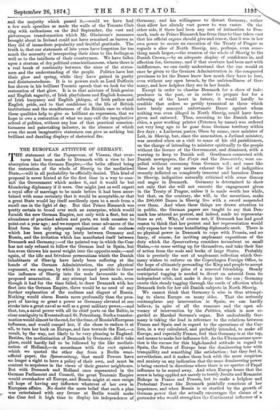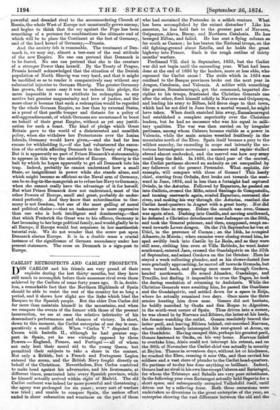THE EUROPEAN ATTITUDE OF GERMANY.
THE statement of the Tagespresse, of Vienna, that over- 1 tures had been made to Denmark with a view to her absorption into the German Empire,—the bribe offered being the restoration of the whole of Slesvig to the mediatised 'State,—will in all probability be officially denied. This kind of proposal is never hinted at for the first time in a way to com- mit the Government which makes it, and it would be but blundering diplomacy if it were. One might just as well expect a royal offer of marriage to be made before it had been ascer- tained with some certainty that it would be acceptable, as that a great State would lay itself needlessly open to a snub from a small one in the light of day. But that Prince Bismarck was pretty certain to brood over such an enterprise, which would furnish the new German Empire, not only with a fleet, but an abundance of practised sailors and ports, we took occasion to point out a year ago ; and we suspect that some advances of the ,kind form the only adequate explanation of the coolness which has been growing up lately between Germany and Russia, and the irritation which has manifested itself between Denmark and Germany ;—of the pointed way in which the Czar has not only refused to follow the German lead in Spain, but &as even thrown his moral weight into the opposite scale,—and again, of the idle and frivolous persecutions which the Danish inhabitants of Slesvig have lately been suffering at the hands of the German A ()ministration, the one physical argument, we suppose, by which it seemed possible to throw the influence of Slesvig into the scale favourable to the proposed annexation. If any attempt had been made, even though it had for the time failed, to draw Denmark with her fleet into the German Empire, there would be no need of any 'further explanation of the coolness and disgust of Russia. Nothing would alarm Russia more profoundly than the pros- pect of having so great a power as Germany elevated at one stroke into a great naval as well as a great military power,—and that, too, a naval power with all its chief ports on the Baltic, in -close contiguity to Kronstadt and St. Petersburg. Such a transfor- mation would almost be the end, for the time, of Russia's European influence, and would compel her, if she chose to endure it at all, to turn her back on Europe, and face towards the East,—a result, by the way, not likely to be very pleasing to England. Besides, the mediatisation of Denmark by Germany, did it take place, could hardly fail to be followed by the like mediati- sation of Holland,—in accordance with the curt opinion which we quoted the other day from a Berlin semi- 'official paper, the Spenerzeitung, that small Powers have no longer a right to have a policy of their own, and must be -content to acquiesce in the views of their greater neighbours. But with Denmark and Holland once represented in the German Parliament and Council, the great Teutonic Empire -would overshadow all Europe, and Russia might at once resign all hope of having any influence whatever of her own in European affairs. No doubt the mere belief that such a plan was entertained with any favour at Berlin would make the Czar feel it high time to display his independence of rather than Germany, and his willingness to thwart Germany, rather than allow her already vast power to wax vaster. On the other side, if there had been any sort of intimation to Den- mark, such as Prince Bismarck has from time to time taken care that his official organs should give and renew, that it was in her own power to secure an execution of the Treaty of Prague as regards a slice of North Slesvig, nay, perhaps, even some- thing much larger,—the reunion of the whole of Slesvig to the Danish Crown,—by an adequate display of confidence in, and. affection for, Germany, and if that overture had been met with indifference, we can easily understand that the cue would at once be given to the German Administration in the conquered provinces to let the Danes know how much they have to lose, even without any open breach, by the unfriendliness of Ger- many, and how helpless they are in her hands.
Except in order to chastise Denmark for a show of inde- pendence in the past, or in order to prepare her for a softening of the heart in future, it would hardly be credible that orders so pettily tyrannical as those which have lately annoyed unfortunate Danes against whom nothing was even alleged in North Slesvig, could have been given and enforced. Thus, according to the Danish autho- rities, a poor working printer (Petersen by name) was ordered not very long ago to be gone from German territory within five days ; a Lutheran pastor, Olsen by name' once minister of Loit, in Slesvig, but, since the annexation, a Jutland minister, was arrested when on a visit to some of his old parishioners, on the charge of intending to minister spiritually to the people without the licence of the Government, and dismissed, with a warning to keep to Danish soil. Gentlemen connected with Danish newspapers, the Freja and the Dannevirke, were ex- pelled without ceremony from German soil ; and cases like these do not by any means exhaust the list of indignities recently inflicted on completely innocent and harmless Danes in Slesvig, indignities naturally criticised with some dismay and anger in Denmark. Germany is determined to show not only that she will not execute the engagement given in the Treaty of Prague, unless it is made worth her while, but that, on the contrary, she will, in the meantime, make the 200,000 Danes in Slesvig live with a sword suspended over them. And when these things are drawn attention to in public, the German papers are taught to say that Den- mark has uttered no protest, and indeed, made no representa- tions as yet. Why, of course not, if Denmark has had good reason to think that her protest and her representation would only expose her to some humiliating diplomatic snub. There is no physical power in Denmark to cope with Prussia, and no fancy, of course, for inviting unpleasant expositions of the duty which the Spenerzeitung considers incumbent on small States,—to cease setting up for themselves, and take their line of action from the nods and becks of large States. Probably this is precisely the sort of unpleasant reflection which Ger- many wishes to enforce on the Copenhagen Foreign Office, in the hope of ultimately persuading the King and people to accept mecliatisation as the price of a renewed friendship. Steady centripetal tugging is needed to divert an asteroid from its independent orbit, and make it drop into the sun ; Germany exerts this steady tugging through the cords of affection which Denmark feels for her old Danish subjects in North Slesvig.
We cannot think that Germany is wise in thus attempt- ing to alarm Europe on many sides. That she seriously contemplates any intervention in Spain, we can hardly believe, in spite of all the rumours and the open ad- vocacy of intervention by the Politica, which is now re- garded as Marshal Serrano's organ. But undoubtedly Ger- many is taking the lead in reference to the relations between France and Spain and in regard to the operations of the Car- lists, in a way calculated, and probably intended, to make all Europe, and especially France, feel that Germany is at the top, and means to make her influence felt. As the Ultramontane ques- tion is the excuse for this high-handed attitude in regard to Spain, the States of Europe bear the domineering tone with tranquillity and something like satisfaction ; but they feel it, nevertheless, and it makes them look with the more suspicion and anxiety on any indication that the same domineering power is being exerted in directions where there is no spectre of Papal influence to be scared away. And when Europe hears that the screw is being applied not merely to terrify Jesuits and Romaniet Bishops in France and Prussia, but to make a helpless and Protestant Power like Denmark painfully conscious of her impotence, and when Russia is so startled by the growth of German power that she actually encourages the claims of a pretender who would strengthen the Continental influence of a
powerful and dreaded rival to the accommodating Church of Russia, the whole West of Europe not unnaturally grows uneasy, and begins to think that the cry against the Pope has been something of a pretence for combinations the ultimate end of which will be to place the Continent at the feet of Germany, and of the hard kernel of Germany,—Prussia.
And the anxiety felt is reasonable. The treatment of Den- mark is, we may say, almost a test-case of the real attitude of the new Empire. No one can pretend that Denmark is to be feared. No one can pretend that she is the creature of a stronger Power than herself. By the Treaty of Prague, Prussia herself acknowledged that the situation of the Danish population of North Slesvig was very hard, and that it might be modified so as to render it comparatively easy without any substantial injustice to German Slesvig. The greater Germany has grown, the more easy it was to redeem this pledge, the more impossible it was to attribute its redemption to any motive but genuine magnanimity and love of justice, and the more clear it became that such a redemption would be regarded by the whole German Empire, no less than by external States, as a proof of that pacific temper and distaste for a policy of self-aggrandisement, of which Germans are accustomed to boast on behalf of their great Empire, without as yet any justifi- cation for such a boast. The kind of pledge which Great Britain gave to the world of a disinterested and unselfish policy, when she withdrew her Protectorate over the Ionian Islands, Germany would have given,—and she had far less excuse for withholding it,—if she had volunteered the execu- tion of the article affecting Denmark in the Treaty of Prague. But it is apparently no part of Prince Bismarck's statesmanship to appease in this way the anxieties of Europe. Slesvig is the bait by which he hopes apparently to get all Denmark into his trap. Indeed, probably he cannot understand how a small State, so insignificant in power while she stands alone, and which might become so efficient as the Naval arm of Germany, can be so dog-in-the-mangerish as to refuse her Navy to Germany, when she cannot really have the advantage of it for herself. But what Prince Bismarck does not understand, most of the other Powers of Europe, small and great, probably do under- stand perfectly. And they know that subordination to Ger- many is not freedom, but one of the most galling of moral and political chains ;—that no taskmaster is more oppressive than one who is both intelligent and domineering,—that that which Frederick the Great was to his officers, Germany is fast becoming to her large political family, and would gladly be to all Europe, if Europe would but acquiesce in her martinetish tutorial rule. We do not wonder that the screw put upon Denmark alarms Europe. It is in a double sense a crucial instance of the significance of German ascendancy under her present statesmen. The cross on Denmark is a sign-post to Europe.































 Previous page
Previous page